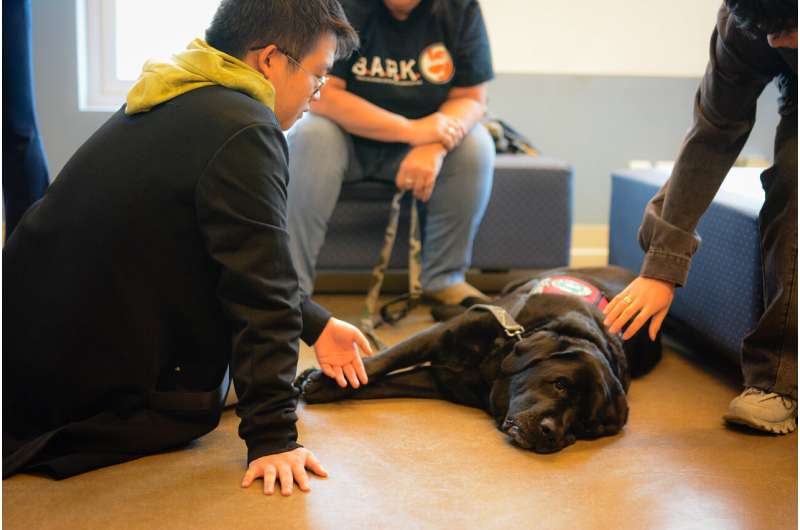This article has been reviewed according to Science X's editorial process and policies. Editors have highlighted the following attributes while ensuring the content's credibility:
fact-checked
trusted source
proofread
Canine cuddles can comfort equally across all genders

While there are a number of studies demonstrating that dog therapy programs can improve a person's social and emotional well-being, many typically have a disproportionate number of female participants.
Recent research led by Dr. John-Tyler Binfet, an Associate Professor in UBC Okanagan's School of Education and Director of Building Academic Retention through K9s (BARK), evaluated if there are gender differences in well-being by setting up separate dog therapy sessions for those who identified as female, male and gender diverse participants.
Dr. Binfet has conducted numerous studies on the benefits of canine therapy, but to his knowledge, this is the first gender-specific study about canine therapy.
"Previous research has explored if it works and how it works, but not who it works for," says Dr. Binfet. "This was one of the first studies that examined whether canine-assisted interventions work equally well for varied genders."
For the study, students self-selected their gender cohort and were assigned to a session on a first-come first-serve basis. Prior to the sessions, they provided reports of well-being; specifically measuring their self-perceptions of campus and social connectedness, happiness, optimism, stress, homesickness and loneliness.
A total of 163 students—49% women, 33% men, and 17% non-binary and other genders—participated in 20-minute sessions. In groups of three to four, the students engaged with a therapy dog and handler, and following the session they filled out a survey. The results showed, as expected, that there was a significant increase in well-being and a decrease in homesickness, stress and loneliness. The results also demonstrated that canines have a comparable positive wellness effect across diverse gender identities.
"In light of previous studies that note participants were predominantly women, our sampling of men, genderfluid and two-spirit participants furthers our understanding that the efficacy of these interventions does not appear to be gender dependent," says Dr. Binfet. "The vast majority of responses showed that the dogs helped the students feel and experience something positive regardless of their gender."
The findings could influence post-secondary mental health and wellness programs as educators continue to seek low-cost and low-barrier inclusive options for students.
The research is published in the journal Human-Animal Interactions.
More information: John-Tyler Binfet et al, A mixed-methods examination of an on-campus canine-assisted intervention by gender: Women, men, and gender-diverse individuals' self-reports of stress-reduction and well-being, Human-Animal Interactions (2023). DOI: 10.1079/hai.2023.0037
Provided by University of British Columbia





















